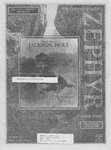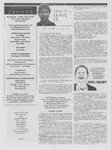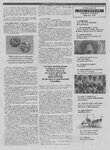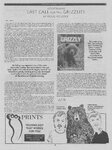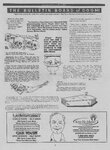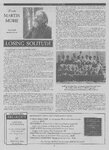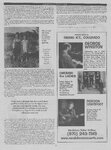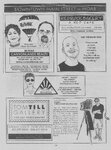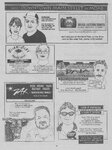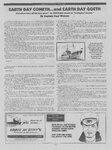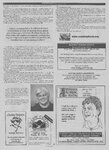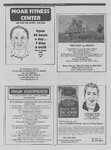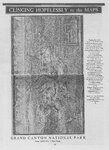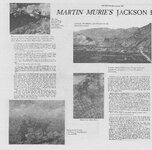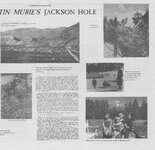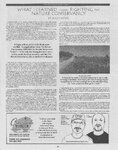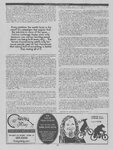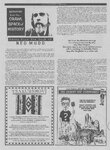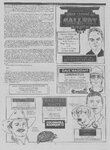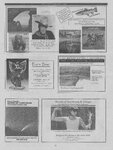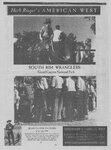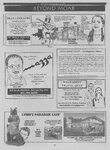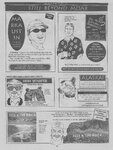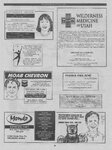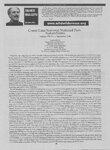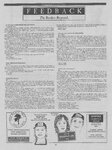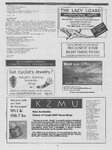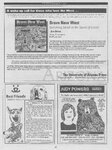| OCR Text |
Show THE ZEPHYR/JUNE-JULY 2007 lone car passes down the highway, chains thrumming on packed snow. Radiators in the room have their hissing spells. We are listening to the teacher. She's reading to us. We don’t squirm, she has us in a spell. Third grade, fourth grade, long trail awinding .. . eighth grade, Mrs. Hattie Erzinger in charge. She’s chosen our next reading, /The Covered Wagon/ by Emerson Hough. That was my first acquaintance with Jim Bridger who is acting as scout and guide for the train. I remember his telling one of the pilgrims seeking a new start in Oregon Territory that “Ma’m, it’s nigh three hundred miles beyond Laramie to the South Pass, an’ the South Pass hain’t halfway to Oregon. Why, Ma’am, we ain’t well begun” But by the time they reached Oregon those naive, tenderfoot pilgrims were well seasoned; they had gone through a transcontinental change, now they were pioneers. Heroes. We Jackson's Hole kids could appreciate that, we had learned from adult talk that pioneers were admirable. Mrs. Erzinger read the ending of the novel with no apparent embarrassment. Here it is, in part: “... oxen stumbling and loose wheels wobbling ... may the picture of our own Ark of Empire never perish from our minds.” 2 I have to say, that went down well; we kids were only a whisper in time from the first settlement of Teton County. On Robert Miller’s property rested the first wagon to come over Teton Pass. Our teacher’s next choice celebrated the Mountain Men. I’ve forgotten the author and title, but not the lingo. “Waugh!” and “Thar floats my stick,” meaning From MARTIN MURIE skerihog@ westelcom.com “Those are my firm thoughts on such and such.” One afternoon our mountain men ride into a valley that could just as well be ours. Suddenly they are attacked by Blackfeet war- riors.. End of chapter. Mrs. Erzinger raised her eyes from the book, looked at us. “Shall I o on?” We whooped and hollered yes. She went on. It was an affair of complicity, the whole roomful stealing time from tasks mandated by the State of Wyoming: arithmetic workbooks, Palmer penmanship drill... steel pens flicking ink, cramped hands trying to imitate the perfect examples in the text, thereby negating admonitions to relax and get a nice ven flow in our motions.. - required reading in the thin, green text, /Wyoming Agriculture/, and spelling. Yes, even in eighth grade we had to keep at the spelling, standing in Opposing teams at the front of the room, the teacher reading the words. When you missed you sat down. LOSING SOLITUDE THE JACKSON HOLE I LOVED...PART 1 Low ceilinged log house, headquarters of the STS dude ranch on the Snake river bottoms, a late fall or winter night. These are childhood memories. A crowd of friends, us kids tucked away here and there, a low fire in the cobblestone fireplace, only one or two lamps alight. The dudes and other summer visitors are gone, the cattle shipped, Jackson’s Hole natives are free to visit and visit they do. ‘Tonight the main center of attention is Major Mapes, a world traveller. He is well supplied with tales of adventure. There is his story of falling deathly sick and being nursed back to health by a beautiful “native” woman, out in the wilds somewhere. Buster Estes, dude rancher, formerly a teamster and cowboy from Colorado, loves to get other people to tell their tales. He urges the major on. On other occasions Buster tells stories too, admonishing his wife, Frances, “All right Slim, let me talk.” Their daughter, two or three years older than me is somewhere in that warm and shadowy room that’s softly limned by firelight flicker, shadows in all the corners, as are my sister and brother and other kids who are not paying much attention to each other, we are listening to ad- ventures, the behaviors of those strange and amazing people, Adults. The major proceeds. After a while, as climax, he brings out his photo of the body of the “bandit,” Pancho Villa. We kids come forward to view the bullet-ridden body, the photo - apparently taken by Mapes himself, in 1923, the year of Villa’s assassination by govern- ment connivance, but we kids don't know that. Maybe Mapes doesn’t know it either. Wow! Visions of Mexican bandits!” Francisco “Pancho” Villa, a non-smoker, non-drinker who loved to dance. It was said that he could out-dance anyone. A leader of revolution in northern Mexico, allied with Emiliano Zapata hundreds of miles to the south. Villa and Zapata finally met face-to-face in the outskirts of Mexico City during the Aguas Calientes convention, where a big division was clearly evident, the “constitutionalists” afraid of the more democratic tenden- cies of the Villa and Zapata forces. Bystanders reported a snippet of their conversation: Villa. “They (Constitutionalists) are men who have always slept on soft pillows.” Zapata. “Those /cabrones/! As soon as they see a little chance, well, they want to take advantage of it to line their own pockets, well, to hell with them!” Time passed, slowly...youth pace. People in the grip of the Great Depression; homeless citizens wandering through, splitting and stacking wood, weeding gardens for a meal. Indian Jack stayed longer than most. He built a shelter at the town dump, on the east side of town at the foot of that high rise of mountains. Some kids burned it down. He complained, no one did anything about it. He rebuilt, and then disappeared. I don’t mean he was done away with. He must have figured the winter and hateful kids were too much misery and moved on south. Indian Jack, homeless wanderer. No one knew his real name, no one really gave a damn. Jackson Grade School. We sit at our desks in the two-story brick building that’s equipped with a silo-shaped metal fire escape. From Lamb and Reed Lumber across the street comes the occasional mild slap of board on board, or the faint whine of a saw. A End of chapter. Mrs. Erzinger raised her eyes from the book, looked at us. “Shall I go on?” We whooped and hollered yes. She went on. Other teachers were also prone to read past the time they had allotted to reading, even the severe seventh grade disciplinarian, Beth Hoffman, who was known for keeping order by occasionally bonking a student on the head with a thin speller. We endured a number of severe crises as Miss Hoffman led us through the long drawn out drama of /Twenty Thousand Leagues Under the Sea/. Once the Nautilus was trapped under polar ice, no way out. And there was the battle with giant squids and the sharks and the secret underwater run from the Red Sea into the Mediterranean. Miss Hoffman went overtime for those. She brought us through a Fenimore Cooper novel too, page by page, standing erect, a hanky in one hand, her voice hypnotic, not once turning to the roll-down maps behind her to show us the Mediterranean or Red Sea or Hudson river. i Miss Phyllis Boyle, fifth grade, read /Smoky the Cowhorse/, and Mrs.Saunders (third grade) took us through Ernest Thompson Seton’s /Wahb the Grizzly/ and Booth Tarkington’s /Toby Tyler and the Circus/. _NOW AVAILABLE BREAKOUT A NOVEL BY MARTIN MURIE A cross continent struggle to save people and other endangered species. ORDER SIGNED COPIES DIRECT FROM MARTIN MURIE: LOSING SOLITUDE: A contemporary Western. Developers invade a cowtown....$14.95 WINDSWEPT: Birdwatchers G a biker from Montana tangle with corporation extremists in Medicine Bow, Wyoming....$14.95 BURT’ S WAY: Environmentalist labeled ‘terrorists,’ keep a’ chuggin’ on the Quebec/New Y ork border...$12 RED TREE MOUSE CHRONICLES: Forest animals on Sa What is the future of the forests? They turn activist.....$6.00 $15 os Order direct eee Martin Murie SERIOUSLY INSISTENT: 80 pages of activist critique...$7 00 Plus Postage---$2.20 for the first book, $1.00 for the second. ellie gelapt ie ARTIN MURIE ETS es North Bangor, NY Pea aerate westelcom.com |
